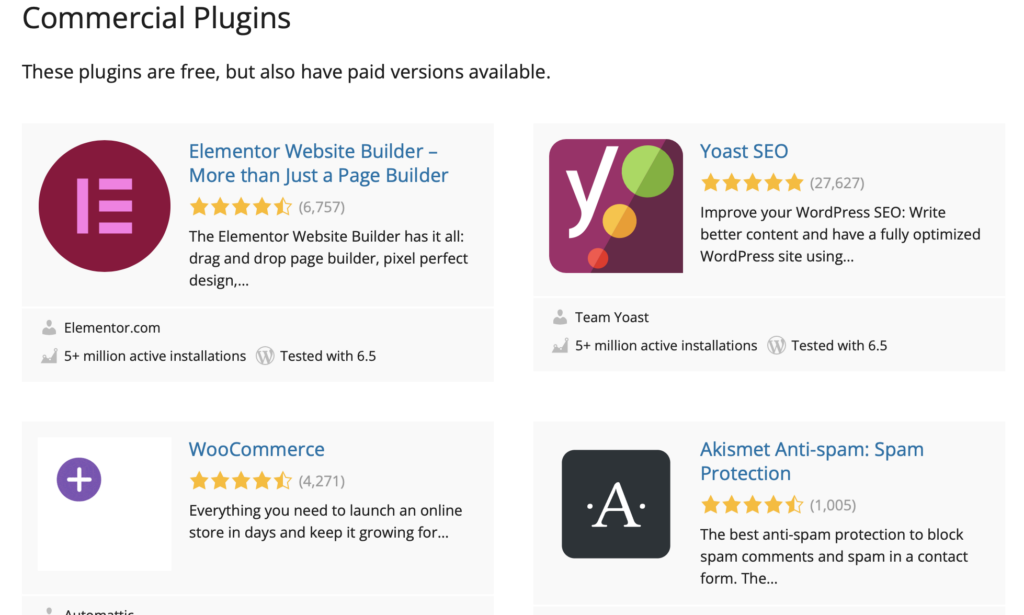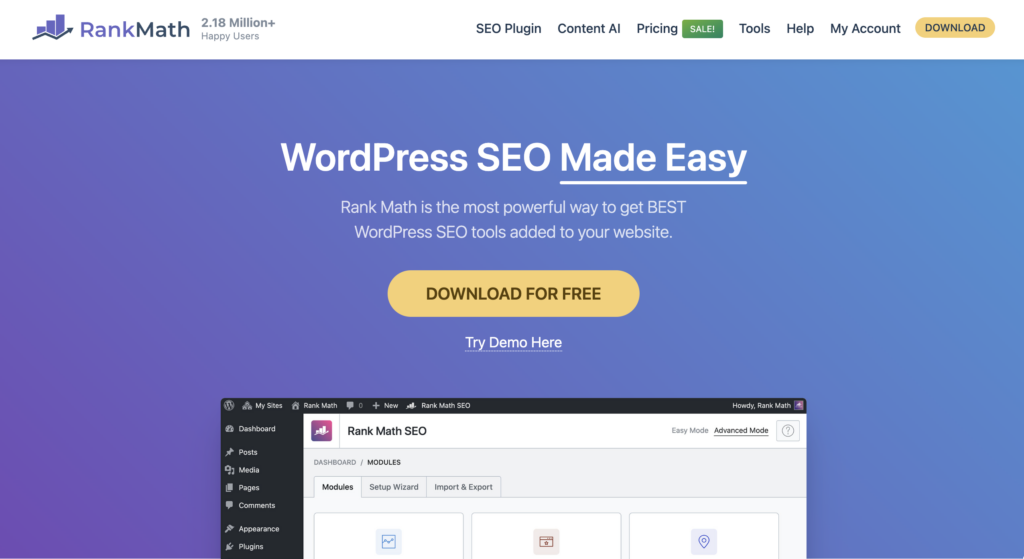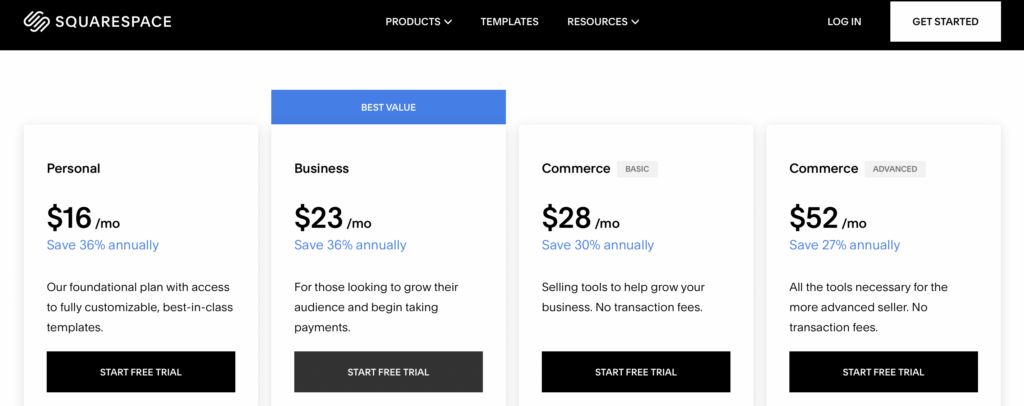Building a new website is key to helping your audience discover you online. After all, your business may not even exist without a digital record on the World Wide Web. There are tons of website builders out there today, but two of the most popular are WordPress.org and Squarespace. How does WordPress vs Squarespace work and which one is right for your new site?
We’re going to dive deep into all of the details to help you decide which one is right for you.
Let’s get started!
WordPress vs Squarespace TL;DR: Which Website Builder Wins?
A self-hosted WordPress site enables you to have the most customization capabilities, with tons of themes, plugins, SEO opportunities, and content creation features. Plus, it is the more affordable of the two website builders.
Squarespace still has areas where it shines though: a lower learning curve, more security, backups and storage space, and more intuitive e-commerce features. However, it comes with a premium price tag that may place it out of reach of someone just getting started.
What is WordPress?

WordPress is one of the most popular options for building a website because it contains excellent tools for creating blogs, e-commerce stores, and so much more. This software is something you can easily install with a separate web hosting plan. Their content management system enables you to build a responsive website in their visual editor with just a few clicks.
Because of its robust features, it currently powers 42.7 percent of all websites. That means that you have likely come across WordPress sites in your Google searches and on your favorite pages.
It’s important to note here that there are two versions of WordPress you might use to make a website: WordPress.org and WordPress.com.
This article focuses on WordPress.org which allows for the most control and flexibility for your website. While you do have to pay for web hosting on WordPress.org, it is a free open-source software whereas WordPress.com is a paid website builder.
What is Squarespace?


Squarespace is an important player in the realm of website building. If you have a limited amount of time to spend learning how to create and then actually creating a website, then Squarespace may be the better fit for you. It has a wide range of templates that you can customize with a drag-and-drop editor.
The benefit of a Squarespace website is that it is an all-in-one platform. Where you have to find hosting for a WordPress website, Squarespace’s pricing features hosting included.
If you’re looking for a visual website builder, then Squarespace may be the right move for you. As we’ll see in a minute, it has tons of templates and a small learning curve that enables you to get set up as fast as possible.
WordPress vs Squarespace: How Do They Compare?
Which platform gives you the best experience when it comes to building a website? There are many factors to consider, and the answer may not be straightforward. Here is what you need to know when it comes to WordPress vs Squarespace.
User Experience and Learning Curve


Are you interested in getting off the ground as fast as possible? For many fledgling businesses and bloggers, speed from start to finish is an important factor. Squarespace tends to be easier for most business owners to manage, at least upfront. Its drag-and-drop editor allows you to make a simple website in just a few clicks.
On the other hand, a WordPress site tends to have a steeper learning curve. While it isn’t impossible to learn how to use WordPress effectively, it does require a bit of an initial time investment. But if I learned how to create a site on WordPress (and I have, several times over), then anyone can do it.
Still, you may find that a bit of coding knowledge is helpful in WordPress whereas Squarespace renders the need for code unnecessary.
Templates and Theme Selections


A theme or template enables you to get off the ground running with web design. WordPress is a clear choice for templates and theme selections with more than 3,000 WordPress templates to choose from. You can stick with a free template or upgrade to a more advanced theme for a small sum.
In short, there are lots of good options, but it could be overwhelming to narrow down to just one option.
Squarespace features more than 100 templates you can use to customize your website, but the actual ability to customize them is limited (more on this in just a second). If you don’t want to be overwhelmed by the process of selecting a WordPress theme, then this might be the smarter move.
Customization


And here we come to the most important aspect of building a site: customization tools. Which website builder enables you to have the most control over design: Squarespace vs WordPress?
Squarespace features limited functionality when it comes to customizing its templates. You can do a lot with the drag-and-drop editor, but it isn’t a foolproof method. If they don’t have an item available for you to drag into place, you won’t be able to create it by inserting code or installing a plugin.
It’s great for beginners who don’t want to dabble in code, but advanced users who want full control over their website might be better off with WordPress.
WordPress has a seemingly endless supply of apps and plugins (which we’ll look at next) and allows for serious customization if you know a little bit of coding. I know very little coding and was able to create a website that matched the vision in my head. But even if you don’t, their block editor makes it easy for a beginner to build a functional page.
Apps and Plugins


Many websites can benefit from having additional functionality associated with apps and plugins. Who offers more of these third-party plugins for your website: WordPress vs Squarespace?
Squarespace has extensions, but they are the same as WordPress’s plugins. They are third-party tools that enhance the functionality of your site. However, they don’t offer many options with the complete list of sanctioned Squarespace extensions hovering at just under fifty.
On the other hand, WordPress’s premium plugins have thousands of options to choose from. You can do anything from creating a testimonial slider to navigating e-commerce features. It makes it easier to both customize your website and has more backend functionality with website traffic tracking and more.
Search Engine Optimization


Do you even have a website if it doesn’t show up on the search engines? WordPress and Squarespace both offer search engine optimization (SEO) tools to help you get discovered.
Your new Squarespace site has some great features for SEO right out of the gate. For example, it allows you to create custom URLs that are great for targeting specific keywords. Other SEO features include a few heading options, image captions, mobile responsiveness, and SSL encryption.
Your WordPress account, on the other hand, offers more advanced functionality. You can do everything you can with a Squarespace site and more: adding image alt text, title tags, meta descriptions, and the ability to add twice as many heading types.
Plus, tools like Rank Math and other SEO plugins enhance what you can do at a base level.
Security


While it can be extremely tempting to go with the WordPress content management system, the security it offers to users is worth a second thought. Plugins and add-ons are created by third parties and may need updates regularly. Who is responsible for installing and managing those updates? That’s right — it’s you!
If you don’t keep up-to-date with your website, you might find that things get broken over time. This is the downside of the flexibility and customization of the content management system. It puts more of a burden on the website creator than it does on the website builder itself.
Squarespace is a much more robust option when it comes to security features. It’s not an open source platform which means that only Squarespace can make changes to the available functionality. In other words, your site is never going to be broken from lack of updates or hackers. They update your website automatically, taking the pressure off of you.
Backups and Storage


Both WordPress and Squarespace sites should be paying attention to backups and storage. This means that your website isn’t going to fall into the abyss if something goes wrong. What can you expect in this area from WordPress vs Squarespace?
If you’re building a WordPress website, then you want to install a third-party plugin that enables you to create backups regularly. You get as much storage as you need to keep a couple of previous versions of your website, but you have to hope that the plugin you install will work as described.
Don’t forget to check for updates to this plugin that could affect performance!
On the other hand, Squarespace creates automatic backups with unlimited storage. According to their forums, they don’t want users to have to be concerned with the more technical aspects of managing a website that should be left to engineers and tech professionals.
eCommerce Features


No comparison of website builders would be complete without looking at the features that enable you to create online stores. The good news is that both platforms offer an easy solution for someone who wants to create a store but isn’t a website designer. You don’t need custom CSS to create something that looks good.
Squarespace is a great option because it builds e-commerce features right into the platform. All you have to do is click on an online store widget, drag it onto the page, and start customizing — easy as that! They also simplify accepting payments with add-ons like TaxJar, PayPal, Stripe, Apple Pay, and more.
It’s still possible to create an online store with WordPress, but it’s a little more cumbersome. You’ll need to install plugins like WooCommerce to get to the bottom of things.
Blogging Features and Content Creation


WordPress fans have been raving about the site for years when it comes to blogging functionality. Their website builders have tons of blogging templates and their SEO features make you more likely to show up in search engines for your content. A WordPress blog is one of the best and easiest sites to run and allows for monetization.
See our complete guide on how to start a blog that makes money here.
Squarespace also has blogging templates you can use, but it simply isn’t as user-friendly for creating a site with lots of content creation. You’ll get more control over your blog with WordPress vs Squarespace.
Customer Support


Last but not least, how does customer support shape up when it comes to Squarespace vs WordPress?
Because your WordPress site is run off of open-source code, there is no customer support for you to reach out to. It’s able to be edited and modified by anyone, and the entire platform is run by a team of dedicated volunteers. You won’t find any live chats or friendly customer service reps here.
Squarespace offers much more in terms of support. You can contact them via email, live chat, Facebook Messenger, and even on X. They do not offer phone support though.
Pricing for WordPress vs Squarespace


WordPress.org is a totally free software, but that doesn’t necessarily mean there are no costs. You will still have to pay for hosting through a platform like Bluehost which can cost a few dollars each month (when billed annually). Plus, you will have the cost of a theme if you choose something more advanced and any premium plugins you want to use.
Squarespace pricing is a bit more expensive. A personal plan starts at $16 per month while a business plan will set you back $23 per month if you want to sell on your storefront. All come with a free custom domain.
Final Thoughts: WordPress vs Squarespace?
You want a robust website builder, and you want to get started quickly. A WordPress vs Squarespace comparison can be challenging, so think about what your priorities are for your website’s functionality. Both have areas where they shine and where they could grow over time. Which one is right for your new site?
